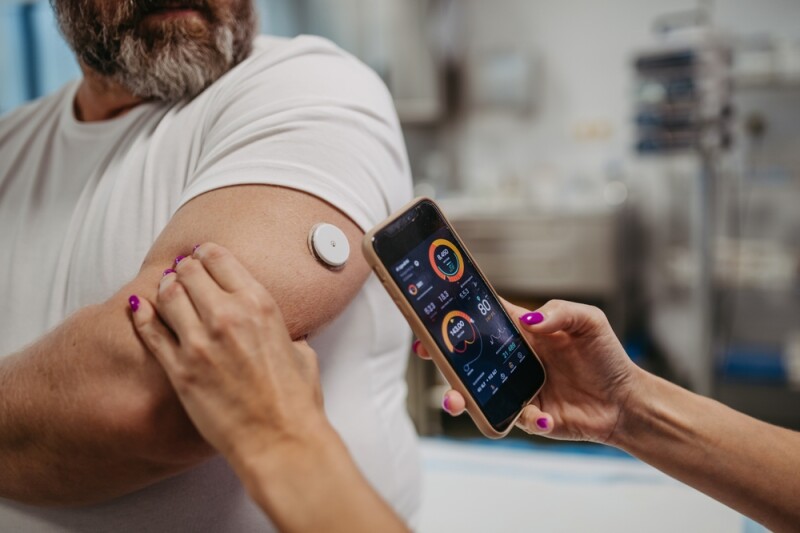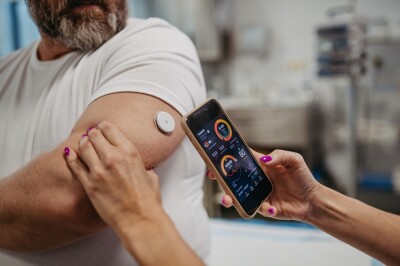Case Study Excerpt: Addressing the Root Cause of Perimenopause Symptoms

Patient Information
Diane is a 44-year-old stay-at-home mother of three children living in a suburb outside Cincinnati, Ohio. She and her husband, Dale, have been married for 15 years, not all of which have been easy.
- Date of Birth: April 3, 1979
- Race/Ethnicity: Caucasian
- Marital Status: Married
- Problems: Fatigue, low mood, irritability, heavy and irregular periods, low libido, frequent headaches, anxiety
- Allergies: None
Social History
- Alcohol: Drinks socially
- Smoking: No history
Vital Signs
- Height: 5’6”
- Weight: 165 pounds
- BMI: 26.6
- Blood pressure systolic: 118 mmHg
- Blood pressure diastolic: 78 mmHg
- Non-fasting glucose: 100 mg/dL
- Medication: None
Practitioner Perspective: Wendy Warner, MD
To Dr. Warner, Diane’s situation is all too familiar. As a traditionally trained OBGYN now practicing functional gynecology, Dr. Warner is used to treating women struggling with symptoms of perimenopause and menopause. Between working, taking care of the kids, and keeping up the household, women in their 40s and 50s often aren’t prioritizing self-care. But for patients like Diane who are becoming symptomatic, Dr. Warner says if they’ve never taken care of themselves, now is the time to start.
First Visit
Before meeting with Diane, Dr. Warner would have a health coach or nutritionist do a patient intake, helping Diane complete new patient paperwork detailing her health history, current symptoms, diet, and lifestyle.
During their actual visit, Dr. Warner would ask Diane more specific questions about not only her physical symptoms but her stressors, lifestyle, and emotional well-being, all of which could be contributing to her health problems.
On paper, Diane seems like a typical perimenopausal woman experiencing fatigue, mood swings, and irritability. However, to properly identify the root of Diane’s problems, Dr. Warner would need to delve deeper into some of her reported symptoms. For instance, Dr. Warner would want to know more about Diane’s menstrual cycle, like how often she’s getting her period and how heavy her flow is.
Diane also reported having low libido. When patients report “low libido,” Dr. Warner says it’s important to distinguish whether they’re lacking a sex drive and experiencing sexual dysfunction or if they’re simply disinterested in sex. Libido, Dr. Warner says, refers strictly to interest; so, if Diane is unable to have an orgasm or is having painful sex, that’s a very different issue.
If Diane is having sex, Dr. Warner would make it clear to her that because she’s still menstruating, regardless of whether her cycle is irregular, she could still get pregnant. Dr. Warner would discuss birth control options with Diane to prevent unwanted pregnancy, which Dr. Warner says is not limited to the pill. For couples who are absolutely sure they don’t want any more children, a vasectomy for the male is a good option since it’s effective and less risky than female sterilization.
Dr. Warner would also like to learn more about Diane’s headaches. With an herbalist background, Dr. Warner knows several different kinds of headaches exist. To get to the bottom of what’s causing Diane’s, Dr. Warner would ask about the time of day she usually experiences her headaches, if they coincide with her cycle in any way, if they’re related to food or stress, what they feel like, and where the pain is most concentrated.
Without proper sleep, Diane’s symptoms will not improve. Dr. Warner would address sleep hygiene with Diane, asking her about her sleep schedule and how she settles down at night. Dr. Warner would also ask about Diane’s sleep quality, including whether she wakes up hot or hungry, which could be signs of adrenal dysfunction and hypoglycemia.
Marital stress can take a real toll on both emotional and physical wellbeing. Because Diane reports feelings of resentment towards her husband and a history of unsuccessful marriage counseling, Dr. Warner would explore how those stressors could be impacting her health. Despite Diane’s “acceptance” of her situation, Dr. Warner would ask if she still holds negative feelings towards her husband and explain the science behind the physical impacts of that kind of stress. Dr. Warner would not allude to divorce during their first visit, especially considering Diane’s religious values, but she may explore coping mechanisms to help reduce any emotional reactions that could be taking a toll on Diane’s health.
In addition to her marriage, Dr. Warner would ask more about Diane’s workload and household responsibilities. Between homeschooling five children, being on the school board, transporting her boys to their extracurriculars, cooking dinner, and cleaning the house, Diane has a lot on her plate. To ease stress, Dr. Warner would ask what commitments Diane would be willing to give up. For instance, Diane could leave the school board, or if she’s not benefiting financially from homeschooling the children from her church, she may want to consider homeschooling only her daughter.
For testing, Dr. Warner would want to first focus on Diane’s blood sugar, which is likely unstable and worsening her symptoms. To assess Diane’s glucose levels, Diane would order a comprehensive metabolic panel, hemoglobin A1c, and fasting glucose and insulin test.
For a better understanding of Diane’s stress hormones, Dr. Warner would test Diane’s cortisol and DHEA levels, which must be tested when a patient is fasting and before 9 am. Dr. Warner says that other, more in-depth hormone testing is expensive and isn’t always necessary. After working in gynecology for 30 years, Dr. Warner says she has become familiar with patterns and often doesn’t need testing to diagnose hormone imbalances.
Then, to understand the effects of Diane’s diet on her body and her levels of inflammation, Dr. Warner would order an advanced lipid panel. Dr. Warner would also order a full thyroid panel, including antibodies, to check for thyroid problems, which commonly begin in midlife. Dr. Warner would also test Diane’s levels of vitamins D and B12 as well as Omega-3.
Care Plan
Dietary changes: A big focus for Dr. Warner would be improving Diane’s diet, which is currently meat and starch-heavy with insufficient vegetables. Dr. Warner’s plan would involve working with a health coach to introduce more vegetables and reduce excess carbs. Dr. Warner says this change is crucial for hormone production and managing blood sugar levels, especially given the impact of cortisol on insulin.
Sleep hygiene: Dr. Warner would suggest Diane reduce screen time before bed and create a calm environment for better sleep. For persistent insomnia or brain chatter, herbal remedies like lemon balm, milky oat top, and passionflower might be recommended.
Personal time and delegation: Dr. Warner would encourage Diane to find time for herself, even if it’s a short period before bed. Depending on Diane’s family dynamics and beliefs, this might involve delegating tasks to family members or hiring help for household chores.
Physical activity: The care plan would gently incorporate physical activity, such as walking, to help with muscle mass and blood sugar stabilization. The focus would be making time for solitary, nonmultitasking walks to provide mental relaxation.
Stress Management: Dr. Warner would introduce the concept of coherence and balance in the nervous system through the practices taught by the Institute of Heart Math. These techniques involve breathing and actively creating positive emotions to rebalance stress hormones.
Supplements Dr. Warner would consider for Diane include:
Chasteberry: Dr. Warner would likely start Diane on Chasteberry right away, which can help improve progesterone production and help stabilize periods and mood swings.
Siberian Rhubarb Extract: If Diane were experiencing hot flashes, Dr. Warner would suggest Siberian rhubarb extract, which can reduce hot flashes through a slight increase in estrogen.
Herbal Supplement for Blood Sugar: Depending on Diane’s lab results, Dr. Warner might recommend supplements for blood sugar regulation, which commonly include a combination of herbs such as bitter melon and fenugreek powder.
Maca: According to Dr. Warner, Diane likely has adrenal dysfunction which can be supported with supplemental maca.
Case Considerations
To motivate Diane, Dr. Warner would offer an overview of the necessary changes and allow Diane to choose which aspect to tackle first. This patient-led approach helps prevent overwhelm and encourages gradual, sustainable changes. Dr. Warner would also explain the interconnectedness of Diane’s symptoms to provide a clearer understanding of how certain changes can have broad benefits.
Diane lives a busy life, and finding time to cook healthy meals can be difficult. Dr. Warner would ensure Diane worked with a health coach to develop recipes for the whole family and find ways to include her kids in the meal-making process.
Because Diane has conservative religious values, she may not be receptive to stressrelease exercises that Dr. Warner usually suggests to her patients, like mindfulness or qigong. When speaking with Diane about the HeartMath method, which encourages positive feelings and hormone balance, Dr. Warner may relate it to prayer. For instance, a prayer about gratitude is similar to the HeartMath method, whereas a prayer focusing on someone’s problems is not as helpful for stress reduction.
Long-Term
Dr. Warner’s long-term goal for Diane is for her to live more intentionally. Many women Diane’s age are so overwhelmed by work, family, and chores that they end up living without much thought, putting everyone else’s needs before their own. With more intention, Diane could start making decisions based on her physical and mental health instead of doing whatever is quick and easy, helping her live a happier, healthier life.
About the Expert

Wendy Warner, MD is a functional medicine gynecologist and hormone expert. After 14 years of conventional ob/gyn practice, Dr. Warner founded a collaborative holistic medical practice in suburban Philadelphia. There she focused on a functional integrative approach to health and healing, working alongside practitioners from many different backgrounds and offering a wide variety of therapeutic options. In the fall of 2022, she moved her practice to fully online, providing telemedicine exclusively. She is board certified in gynecology and holistic integrative medicine, is a certified Functional Medicine practitioner, an herbalist and a mesa carrier. She is a nationally recognized speaker and educator and is faculty for the Institute for Functional Medicine as well as David Winston’s Center for Herbal Studies. She authored a chapter in the current edition of Rakel’s Integrative Medicine textbook and is the co-author of “Boosting Your Immunity for Dummies”. She is a Past President of the American Board of Integrative Holistic Medicine.
Editor’s Note: This article is an excerpt from the e-book, Addressing the Root Cause of Perimenopause Symptoms: An Integrative Medicine Case Study. To read more, click here.




















SHARE